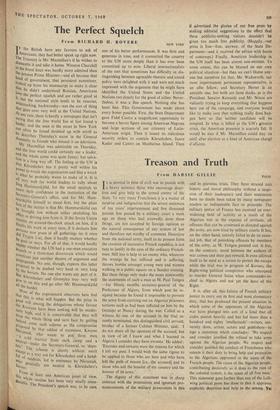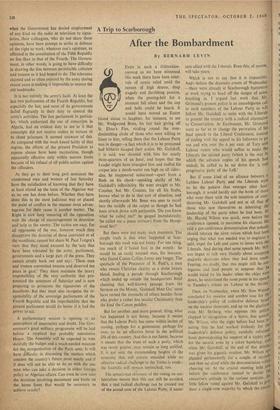Treason and Truth
From DARSIE GILLIE PARtS IT is normal in time of civil war to punish with a heavy sentence those who encourage deser- tion and give help to the armed enemy of the State. To very many Frenchmen it is a matter of surprise and indignation that the severe sentences of ten years' imprisonment and five thousand pounds fine passed by a military court a week ago on those who had avowedly done these things, are not accepted by foreign opinion as the natural consequence of any system of law and therefore not worthy of comment. Desertion from the national army, itself in its present form the creation of successive French republics, is not easy to justify in the eyes of the ordinary French- man. Still less is help to an enemy who, whatever the wrongs he has suffered and is suffering, throws bombs amongst young men and women walking in a public square on a Sunday evening.
But these things only make the more noteworthy the statements of such a man as M. Paul Teitgen —for fifteen months secretary-general of the Prefecture of Algiers, from which post he re- signed because he found it impossible to prevent the army from carrying out on Algerian prisoners tortures such as had been inflicted on him by the Gestapo at Nancy during the war. Called as a witness by one of the accused in the trial re- cently terminated, this distinguished civil servant, brother of a former Cabinet Minister, said: 'I do not share all the opinions of the accused, but in view of all I know and what I learned in Algeria I consider they have excuses.' He added: 'Excesses and• tortures were the reasons for which I left my post. I would wish the same rigour to be applied to those who are here and who have left the path of reason [i.e., the accused] and to those who soil the honour of my country and the honour of its army.'
The dignity of this statement was in sharp contrast with the pretensions and ignorant pro- notincements of the military prosecutors in this and in ,previous trials. They have strayed into history and moral philosophy without a suspi- cion of their inadequacy and their statements have no doubt been taken by many newspaper readers as indisputable fact or principle. The military justice of France has received an ever- widening field of activity as a result of the Algerian war at the expense of civilians; all offences that can be construed as directed against the army, are now tried by military courts. It has, on the other hand, entirely failed to do its essen- tial job, that of punishing offences by members • of the army, as M. Teitgen pointed out. It has, on the contrary, stood between the authors of war crimes and their just reward. It even allowed itself to be used as a screen to permit the escape while the trial was in progress of Kovacs, the Right-wing political conspirator who attempted to murder General Satan when commander-in- chief in Algiers and not yet the hero of the Right.
It is, after all, this failure of French military justice to carry out its first and most elementary duty, that has produced the present situation in which some of the opponents of the Algerian war have plunged into acts of a kind that all codes punish heavily and has led more than a hundred and eighty 'intellectuals'—writers, uni- versity dons, artists, actors and publishers—to sign a statement which concludes: 'We respect and consider justified the refusal to take arms against the Algerian people. We respect and consider justified the conduct of Frenchmen who esteem it their duty to bring help and protection to the Algerians oppressed in the name of the French people. The cause of the Algerian people, contributing decisively as it does to the ruin of the colonial system, is the cause of all free men.' This statement goes farther than any of the Left- wing political press has done in that it approves explicitly desertion and help to the enemy. Yet when the Government has denied employment of any kind on the radio or television to signa- tories, their colleagues, who do not share these. opinions, have been prompt to strike in defence of the right to work, whatever one's opinions, as affirmed in the constitution of the Fifth Republic no less than in that of the Fourth. The Govern- ment, in other words, is going to have difficulty in drawing the line between permissible criticism and treason as it had hoped to do. The tolerance claimed and so often enjoyed by the army during recent years is making it impossible to restore the old landmarks.
It is not entirely the army's fault. At least the last two parliaments of the Fourth Republic, but especially the last, and most of its governments failed flagrantly in their duty to control the army's activities. The last parliament in particu- lar, which authorised the use of conscripts in Algeria, had an evident duty to see to it that conscripts did not receive orders to torture or to shoot prisoners. It seemed unaware of this. As compared With the weak-kneed laxity of that regime, the efforts of the present President to repress abuses have been meritorious, though apparently effective only within narrow limits because of his refusal of all public action against the offenders.
As they go to their long gaol sentences the condemned men and women of last Saturday have the satisfaction of knowing that they have at least stirred up the issue of the Algerian war as no one has done before. Whether they have done this in the most judicious way or placed the point of conflict in the manner most advan- tageous for their cause is another matter. The Right is now busy smearing all the opposition with the charge of encouragement to desertion and help to the enemy. The tactics are easy, for all opponents of the war, however much they disapprove the doctrine of those convicted or of the manifesto, cannot but share M. Paul Teitgen's view that they stand excused by the `acts that have been tolerated by the army, parliament,• governments and a large part of the press. They cannot simply back out and say: 'These men and women committed treason and deserved ten years in gaol.' They must maintain the heavy responsibility of the very authority that pro- nounced the sentences of Saturday and is now preparing to prosecute the signatories of the manifesto. But they must also recognise the re- sponsibility of the sovereign parliaments of the Fourth Republic and the improbability that the present parliament would do better if it had the power to act.
A parliamentary session is opening in an atmosphere of uncertainty and doubt. The Gov- ernment's great military programme will be laid before a sceptical but probably submissive House. The Assembly will be expected to vote dutifully the budget and a much-needed measure for the, reorganisation of the Paris area. It will have difficulty in discussing the matters which concern the country's future most nearly and if it does will not be able to do so with the one man who can take a decision in either foreign policy or Algerian affairs. Can even he now take the decisions involving movement and battle on the home front that would be necessary to achieve results?











































 Previous page
Previous page